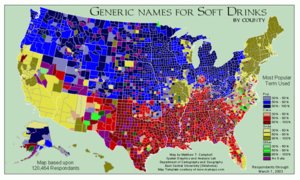tecznotes
Michal Migurski's notebook, listening post, and soapbox. Subscribe to ![]() this blog.
Check out the rest of my site as well.
this blog.
Check out the rest of my site as well.
Oct 10, 2008 9:49pm
dunbar's dungeon
Thought experiment for the day, spurred by jets flying overhead for fleet week. If something out of ordinary is going on, and you need to ask people around you, what do you do?
Imagine a chat system, similar to IRC or AOL - a big room where you log in and talk to lots of other people simultaneously. When you log in, your Fire Eagle account gets a ping, so that the server can know your geographic location to some level of precision. You are then dumped into a big room, with the 150 people physically closest to you in the real world. As long as there are fewer than 150 total people in the system, everyone gets to talk to one another. As more people join, you begin to see overlapping conversation bubbles. You might be in San Francisco, talking to someone in Kansas. That person in Kansas can talk to someone else in New York, but you can't. Your conversational circle is strictly limited to the nearest 150 people, some of whom drop off occasionally as they are bumped out by more proximate newcomers.
As the population of the system grows, everyone's personal horizons begin to shrink. With enough people, eventually you're talking to the people right in your neighborhood. To get a message to someone across the country, you might lie about your location, or ask that it be passed on, Milgram-style.
Would this feel like a natural way to interact with people around you, self-limited to a reasonable number of participants but always those around you? Would people lie about their location? Would it be like Usenet, dense with microscopic subcultures? Would certain people emerge as hubs, offering to post messages around between bubbles in the absence of other means of communication?
